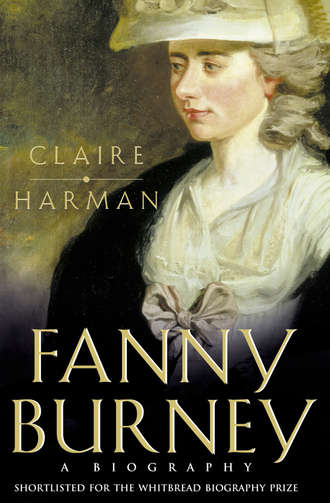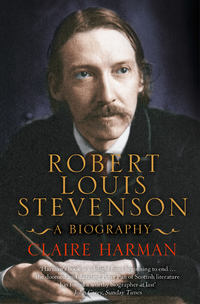
Полная версия
Fanny Burney: A biography
Miss Biddy and Polly take no care of any thing, else, I’m sure, they should always be welcome to my room; for I’m never so happy as in obliging the ladies, – that’s my character, Ma’am; – but, really, the last time they had it, everything was made so greasy and so nasty, that upon my word, to a man who wishes to have things a little genteel, it was quite cruel. Now, as to you, Ma’am, it’s quite another thing; for I should not mind if every thing I had was spoilt, for the sake of having the pleasure to oblige you; and, I assure you, Ma’am, it makes me quite happy, that I have a room good enough to receive you.30
The Branghtons’ ineradicable vulgarity provides much of the humour of the book. Forced to take a party to the opera, Mr Branghton is totally unprepared for the expense of the tickets and makes a scene at the booth, thinking he can haggle over the prices as he might with a fellow tradesman. His purchase of the cheapest possible seats, still in his view extortionately expensive, pleases no one in the party, for they have neither the satisfaction of hearing or seeing the performance properly, nor of being seen by the ‘quality’ in the pit. When the opera begins, their disappointment is intensified: ‘Why there’s nothing but singing!’ Mr Branghton exclaims, and is disgusted by the realisation that it is all in a foreign language too. ‘Pray what’s the reason they can’t as well sing in English?’ he asks; ‘but I suppose the fine folks would not like it, if they could understand it.’31
‘The fine folks’ come off rather worse than the vulgarians, although Burney’s depiction of them is necessarily less convincingly observed. Lord Merton and his friends are all (except for super-virtuous Orville) as stupid as the Holborn crowd, and more culpable. Their affectations and excessive language are evidence of moral malaise; while they should be leading society (Lovel is a Member of Parliament and all the others landowners), their time is wasted in gaming, dangerous sports and dalliance. Evelina’s blue-stocking chaperone, Mrs Selwyn, is the scourge of this set, endlessly showing up their ignorance and folly. When she suggests that they have a competition to see who can quote longest from Horace, none of the fops can join in, despite their expensive ‘classical’ educations: ‘what with riding, – and – and – and so forth’, says one of them, ‘really, one has not much time, even at the university, for mere reading.’32 But while Mrs Selwyn’s ‘masculine’ learning and wit is the vehicle for many of the novel’s home truths, the author makes clear that she finds it ultimately sterile. Mrs Selwyn is too busy ‘reserving herself for the gentlemen’ to function as the sympathetic mother-figure the orphaned heroine needs.
There is no doubt that Evelina’s worth is only recognised at all by Lord Orville because she is also beautiful, but in this profoundly feminist novel Burney gives an original view of the conventional heroine – the view from the pedestal. Evelina’s instant physical impact on other people – of which she is imperfectly aware – is shown as something of a liability (inflaming lustful men and making enemies of jealous women). It is her guarantee of attention, but at the same time an impediment to being truly seen. Evelina exposes – in a way undreamed of by earlier novelists – the double standards applied towards women, in whom everything but beauty and goodness are ‘either impertinent or unnatural’.33 The wit, Mrs Selwyn, is seen as unnaturally intellectual (‘oddish’), and Evelina’s grotesque grandmother, Madame Duval, as impertinently immodest; both commit the cardinal sin of being old. ‘I don’t know what the devil a woman lives for after thirty,’ says dissolute Lord Merton, in one of the novel’s bleakest remarks; ‘she is only in other folks’ way.’34 The lovely young heroine’s hold on her admirers will soon, it is implied, be turned to just such withering scorn, for women past their bloom are not just negligible but irritating – ‘in other folks’ way’ – and a resented financial liability on some man or other.
The scene in Evelina in which the gambling-mad fops organise a race between two very old women is a graphic example of the point. Like the episode in which a dressed-up monkey attacks Lovel, it has been criticised for being excessive and unlikely, but this is not the case: gambling was the mania of the period and the occasions for it bizarre. There was one contemporary case of a gambler hiring a desperado to prove that people could live under water (the desperado drowned, so the gambler tried again with another), and another in which some members of Brooks’s Club laid bets on whether or not a passer-by who had collapsed in the street was dead (no attempts were allowed to help him, which might have affected the outcome).35
Конец ознакомительного фрагмента.
Текст предоставлен ООО «ЛитРес».
Прочитайте эту книгу целиком, купив полную легальную версию на ЛитРес.
Безопасно оплатить книгу можно банковской картой Visa, MasterCard, Maestro, со счета мобильного телефона, с платежного терминала, в салоне МТС или Связной, через PayPal, WebMoney, Яндекс.Деньги, QIWI Кошелек, бонусными картами или другим удобным Вам способом.



